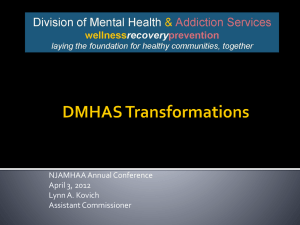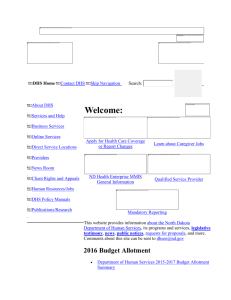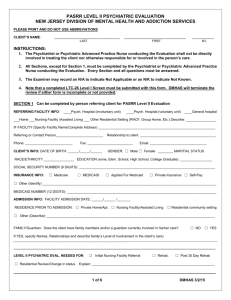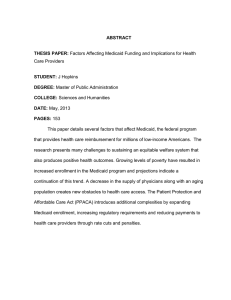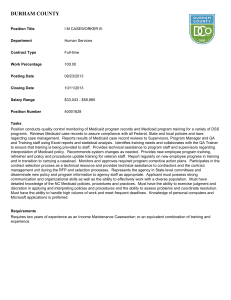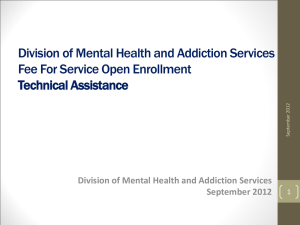T F S
advertisement
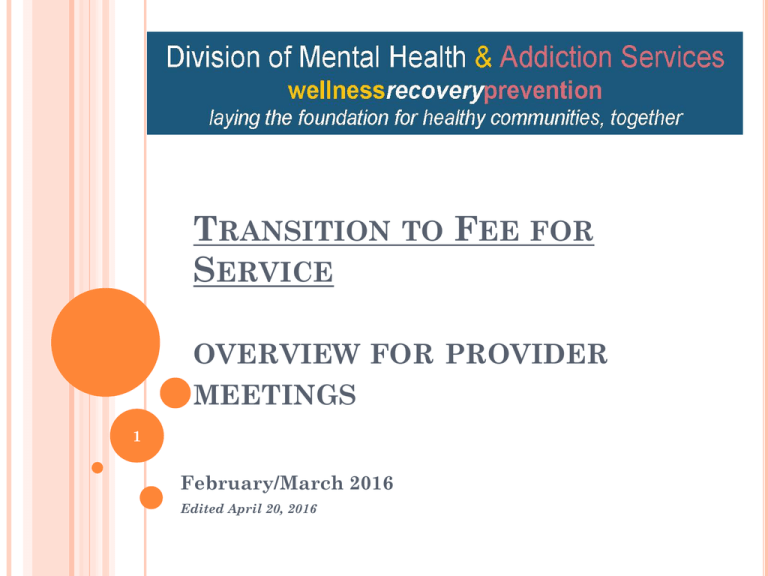
TRANSITION SERVICE TO FEE FOR OVERVIEW FOR PROVIDER MEETINGS 1 February/March 2016 Edited April 20, 2016 INTRODUCTION During his 2016 State of the State and Budget Addresses, Governor Chris Christie announced that $127 million would be invested in enhanced behavioral health services rates for providers. It is the largest overall increase to this community in over a decade and it’s designed to strengthen the organizations that provide critical programs for some of New Jersey’s most vulnerable residents. 2 BACKGROUND The rate study and rate setting processes had been underway for several months. Augmented with stakeholder input, a professional accounting firm and budget experts, the rates were determined and providers are being notified. DHS’ Division of Mental Health and Addiction Services has several meetings scheduled to detail the rates and explain the process. This PPT is part of the presentation. Without context, some information may not be clear so the Division will post one of the information sessions online. Any questions should be directed to the Division by emailing MBHOInput@dhs.state.nj.us. Thank you. 3 FEE FOR SERVICE (FFS) RATE SETTING GENERAL OVERVIEW Goal of creating equity across the DMHAS system Increased system capacity Create greater access for individuals seeking treatment to access the level of care needed at the time needed Standardization of reimbursement across providers Create greater budgeting and expenditure flexibility for providers 4 DHS - DMHAS FEE FOR SERVICE (FFS) RATE DEVELOPMENT Overall objective was to build rates “from the ground up” that are reflective of full costs to provide services. Key assumptions on the inputs for each service were provided to consultants Myers and Stauffer (M&S) by DMHAS program and policy staff, as well as through extensive discussions with providers (practice groups). 7-8 meetings were held with providers to get their perspectives on key inputs that should be considered (e.g., staffing make-up, non-salary costs) DHS - DMHAS 5 FEE FOR SERVICE (FFS) RATE SETTING CONSIDERATIONS Unifying disparate reimbursement methodologies between MH service contracts and SUD service contracts. Consideration of shift to Medicaid-reimbursed services as a result of Medicaid Expansion and changes in eligibility and benefit. DMHAS also conducted its own research into nonsalary costs, wage rates and inflation. Subsequent to initial rate development by M&S, significant discussions were held between DHS/DMHAS Fiscal staff and program staff to review assumptions and make adjustments as appropriate. DHS - DMHAS 6 FFS STAFFING AND FINANCIAL DATA CONSIDERATIONS For each service, rates build in assumptions on: Staffing make-up and credentials, e.g., for Partial Care, Direct Staffing was comprised of a) Medical Director, b) Program Director (LSW), c) Supervisor (MA level), d) Case Coordinator and e) Service Worker. Rates also built in the relative weight that each staff member comprises of the total Direct Staff cost. Financial Data included review of contract database and expenditure reports, provider cost and time studies and Medicaid claims. Wage rates for Direct Care staff were taken from the most recent Bureau of Labor Statistics (BLS) data specific to NJ. An inflation factor was applied to bring those wage rates to more current levels. BLS wage categories were consistent with the functional titles for each service (i.e., considering required credentials) Fringe benefit rates were applied based on available contract data and, to a lesser extent, data from a cost study of several providers that was conducted by M&S. DHS - DMHAS 7 FFS WHAT WENT INTO THE RATES – PRODUCTIVITY FACTOR Productivity factor was applied to the Direct Care wage/fringe benefit cost for each service. This factor was designed to “gross up” the costs to reflect the fact that staff are paid for more than just “face to face” time. Examples of the factors that drove each service’s unique productivity adjustment were: Time required each day for documentation Required meeting time (consultations with other staff) Training/supervision Paid Time Off (holiday, vacation, sick) In cases where more than one staff member is required for site visits, travel time and the increased staff requirement were also considered in the productivity factor. DHS - DMHAS 8 FFS REGULATORY REQUIREMENTS AND CONSIDERATIONS G&A If applicable (e.g., if regulation prescribed), a clientstaff ratio was applied. In other words, if a certain service involves a group of clients receiving treatment delivered by staff simultaneously, the hourly wage cost was allocated to the client/service unit consistent with that ratio. Factors were applied to the wage/fringe benefit rates calculated with above data to account for estimated General and Administrative costs, capital, supplies and infrastructure/overhead. In general, rates were applied based on available contract data. In general, DMHAS gave significant weight to existing regulations and compliance requirements in determining the cost inputs into each service. DHS - DMHAS 9 FFS WHAT WENT INTO THE RATES – COOCCURRING CAPABLE SERVICES Support of co-occurring system and ability to hire staff with credential necessary to provide cooccurring capable service The expectation will be that providers of mental health and substance use disorder outpatient treatment services will be capable of serving individuals with a co-occurring mental illness and substance use disorder (MI/SUD). Providers of methadone treatment (opioid treatment providers) will be capable of serving individuals with a co-occurring MI/SUD 10 DHS - DMHAS FFS WHAT WENT INTO THE RATES – MEDICARE CAPPING Other Considerations: Medicare capping – where applicable, rates were set at 100% of the prevailing Medicare rate (for New Jersey) MAT delivered in an OTP – New rates are weekly bundled rates designed to cover services delivered in OTP. The services in the bundled rate are: case management, medication, dispensing, counseling and medication monitoring. The bundled rate does not include transportation, intensive outpatient, intake or psychiatric evaluation. The rate is standard across all phases of treatment, i.e., same rate applied to clients in Phases I – VI. DHS - DMHAS 11 FFS RATES FOR SERVICES NOT REIMBURSED BY MEDICAID Other Considerations: Room and Board components for Residential services reflect prevailing Fair Market Rents in New Jersey and then adding a factor for food costs per day. Medicaid does not cover room and board. Medicaid vs. State Only Where a service is Medicaid-eligible, State-Only rates set at 90% of the Medicaid rate Since new reimbursement rates reflect providers’ gross costs, we have assumed that State will continue to receive certain third party recoveries (e.g., Medicare, private insurance, client fees), which are currently credited to DMHAS deficit-funded contracts. However, we did NOT assume State recoupment of providers’ county or other government grants, or other fundraising revenues. DHS - DMHAS 12 FFS CONSIDERATIONS IN RATE DEVELOPMENT Impacts in DMHAS, Medicaid and other State agencies that invest in behavioral health programs (e.g., Administrative Office of the Courts, State Parole Board, Department of Corrections). Movement of Medicaid clients off DMHAS contracts and into Medicaid billing driven by the Affordable Care Act. Analysis of impact of phasing in Mental Health State only clients in January 2017 13 DHS - DMHAS FFS RATES – MENTAL HEALTH TREATMENT Service Partial Care, Co-Occurring Capable (hour) Partial Hospital (hour) Current Medicaid $14.55 $33.08 New Medicaid $17.92 $17.92 New State $16.13 $16.13 Outpatient Comprehensive Intake Evaluation Psychiatric Evaluation $54.39-$72.75 $82.17 $140.24 $157.94 $126.22 $142.15 Co-Occurring Capable Outpatient Individual Therapy Co-Occurring (30 minutes) $8.00-$34.48 Individual Therapy Co-Occurring (45-50 minutes) $16.00-$44.63 Group Therapy Co-Occurring (90 minutes) $8.00-$23.00 $68.21 $90.26 $27.50 $61.39 $81.23 $24.75 Family Therapy (60 minutes) Family Conference (30 minutes) $24.70-$46.00 $12.40-$19.00 $113.94 $22.91 $102.55 $20.62 Group Psychoeducational Services (90 minutes) Supported Education/Employment (15 minutes) Medication Monitoring – State only (15 minutes) n/a n/a n/a n/a n/a n/a $5.95 $19.19 $40.88 Targeted Case Management (15 minutes) Program for Assertive Community Treatment (month) $31.10 $38.12 $34.31 $1,377.00 $1,487.81 $1,487.81 $179.23 $143.16 $111.48 $4.10 $43.71 $268.85 $214.74 $167.22 $13.33 $17.55 $241.97 $193.27 $150.50 $12.00 $15.80 n/a n/a $27.47 Residential A+ Services (daily) A Services (daily) B Group Home Services (daily) B Apartment Services (15 minutes) D Family Care Services (daily) Room & Board *Co-occurring rates enable organizations to hire staff who are credentialed to serve individuals who have a mental illness and substance use disorder. DHS - DMHAS 14 FFS RATES – SUBSTANCE USE DISORDER TREATMENT Service Partial Care, Co-Occurring Capable (daily, 4 hours) Current Medicaid New Medicaid New State $83.80 $78.31 $70.48 Outpatient Comprehensive Intake Evaluation Psychiatric Evaluation $54.39-$72.75 $82.17 $140.24 $157.94 $126.22 $142.15 Co-Occurring Capable Outpatient Individual Therapy (30 minutes) Individual Therapy (45-50 minutes) Group Therapy Co-Occurring (90 minutes) $8.00-$34.48 $16.00-$44.63 $8.00-$23.00 $68.21 $90.26 $27.50 $61.39 $81.23 $24.75 Family Therapy Co-Occurring (60 minutes) Family Conference (30 minutes) Group Psychoeducational Services (90 minutes) Medication Monitoring (State-only) $24.70-$46.00 $12.40-$19.00 n/a n/a $113.94 $22.91 n/a n/a $102.55 $20.62 $5.95 $40.88 Intensive Outpatient Co-Occurring Capable (daily, 3 hours) $71.00 $109.48 $98.53 Co-Occurring Capable Methadone/Buprenorphine Methadone (weekly) $4.25 (dispensing) Buprenorphine (weekly) n/a $91.15 $189.71 $82.04 $170.74 Residential Short-Term – Services Room & Board $147.00 n/a $201.60 n/a $201.60 $18.90 Long-Term – Services Room & Board $68.00 (non-Medicaid) incl. in above rate n/a n/a $84.40 $17.60 Halfway House – Services Room & Board $57.00 (non-Medicaid) incl. in above rate n/a n/a $67.90 $17.60 Detox – Services Room & Board $204.00 n/a $408.08 n/a – paid $408.08 $20.20 *Co-occurring rates enable organizations to hire staff who are credentialed to serve individuals who have a mental illness and substance DHS - DMHAS use disorder. 15 FFS RATES – BUDGET IMPACT Behavioral Health Rate Increase: $127.8 million Enhanced federal match and third-party liability: $107.8 million Net State investment = $20 million State funds rate increase: $49.5 million State funds offset by enhanced federal match and thirdparty liabilities: ($29.5 million) 16 DHS - DMHAS FFS MEDICAID The appropriate Medicaid members and Medicaid covered services are to be billed to Medicaid prior to seeking state funding. Providers are required to enroll as a Medicaid provider if receiving state funds. A provider can submit application at http://njmmis.com SUD and CSS services funded through Medicaid and State dollars will be prior authorized by the IME. The rates require CMS approval. True Up: The alternative benefit plan includes SUD treatment services: intensive outpatient, outpatient, partial care, short term residential (nonIMDs), detox (non-IMD), IOP and opioid treatment. Currently the NJ FamilyCare Plan A only includes methadone. As of 7/1/2016, the True Up expands these services to all Plan A members.“ Medicaid is to be billed for individuals 21 years old and younger as well as individuals 65 years of age and older for individuals in IMDs in short term residential and detox level of care as of 7/1/2016. DHS - DMHAS 17 FFS CONTRACT TRANSITION Division approval for cost containments (Social Service Contract Requirements) is no longer required under FFS p/t and f/t salary compensation limitation Salary compensation limitations for physicians and APNs Employee severance agreement Travel expenses Tuition reimbursement Restriction for provider-agency sponsored meetings, conferences and special events Vehicle requests DHS - DMHAS 18 FFS CONTRACT TRANSITION – CASH FLOW Cash flow considerations upon implementation Upon FFS implementation, DMHAS will allow providers the opportunity to request up to two months of contract payments as an advanced payment against future FFS revenue Amount advanced must be paid back to the Division within the same State Fiscal Year Proposed criteria under consideration for advanced funding: Attestation of commitment to be a participating provider for 24 months Provider must be in “good standing” Provider must submit a 24 month cash flow analysis Financial stability review Final policy and procedures being drafted and will be shared in March DHS - DMHAS 19 FFS TIMELINE FOR IMPLEMENTATION •Medicaid rates for MH and SUD become effective •Medicaid True-Up* for SUD becomes effective •State rates for SUD becomes effective July 2016 •SUD state rates become fully FFS •IME Prior Authorization for SUD January 2017 • State rates for MH becomes effective • MH state rates become fully FFS • Managing BH services Next *The alternative benefit plan includes SUD treatment services: intensive outpatient, outpatient, partial care, short term residential (non-IMDs), detox (non-IMD) and opioid treatment. NJ FamilyCare Plan A only includes methadone. The True Up expands Plan A coverage to mirror the ABP. DHS - DMHAS 20 FFS - CONCLUSIONS Providers should be assured that DHS/DMHAS staff have worked diligently to develop rates that are reflective of expected provider costs and that will ensure access to needed behavioral health services. Success – from a State affordability and Budget perspective – hinges on fully leveraging federal Medicaid resources. Providers will need to enroll as Medicaid providers if they are not already. All Medicaid-eligible clients will need to be billed appropriately to Medicaid. Success at provider level hinges on ability of agencies to truly understand their unique costs to deliver each service so that they may develop “P&L’s” (Profit/Loss) for each of their business segments. DHS - DMHAS 21
